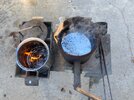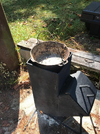Targa
Member
I have been slacking the last six months or so, due to shoulder surgery mainly and just realized I am out of processed lead for casting. I have a couple five pound buckets of range lead that I need to process.
For me, it is the nastiest, dirtiest, most toxic process in my reloading endeavor that I subject myself to but it is worth it, right now anyway. I can certainly see myself possibly forking up the coin in the future and buying a 1,000 lb pallet of lead ingots, which would easily last me the rest of my life from one of the online distributors. Just musing a bit, really no point to this thread.
For me, it is the nastiest, dirtiest, most toxic process in my reloading endeavor that I subject myself to but it is worth it, right now anyway. I can certainly see myself possibly forking up the coin in the future and buying a 1,000 lb pallet of lead ingots, which would easily last me the rest of my life from one of the online distributors. Just musing a bit, really no point to this thread.
Last edited:




